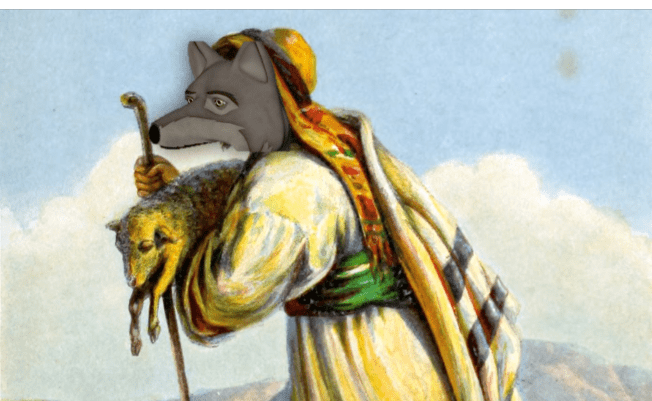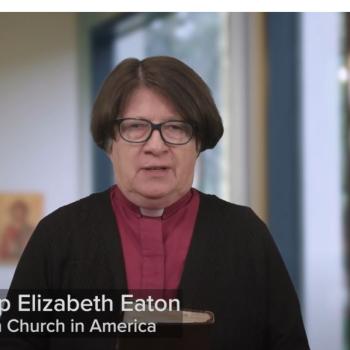“Beware of Wolves in Shepherds’ Clothing” is a sermon I preached to students in the ELCA’s Theological Education for Emerging Ministers (TEEM) program at a worship service on Feb. 9, 2022, hosted by the Indiana-Kentucky Synod. The texts were Jeremiah 1:1-10 and Jeremiah 23:1-4.
Let those who have ears hear.

It was a tough time to be the sheep.
The shepherds they had trusted to protect and guide them with God’s commands of justice and righteousness turned out to be wolves in shepherd’s clothing. They cared only about preserving their own power. They exploited and abused the sheep. And no one seemed to be doing anything about it!
There was a whole system of corruption among the shepherds that enabled them to cover for each other. They got away with violating God’s covenant without any consequences. Not only that, but the leaders sold them out! Powerful entities got their claws into the shepherds and convinced them to betray key leaders in order to save their own skins.
The sheep wondered, where was God in all this?
Didn’t God see what was happening? Didn’t God care? Wouldn’t God do something, anything to help them?
They were understandably losing faith. No one seemed to have courage to tell the truth about what was happening and to stand up for what was right. The sheep were afraid. Frankly, the shepherds were afraid, too.
This was the situation Jeremiah faced when God called him to be a prophet to the people of Judah.
From 626—587 BCE, Jeremiah witnessed horrendous events resulting from the corruption of the kings and idol worship. He watched the military invasion of his country, desecration of their holy places, and even the sacrifice of children. The book of Jeremiah is a collection of writings about his early life, his call to be a prophet, and what it was like to witness the destruction of his people.
The importance of telling the story
Historically, the book was actually compiled during the Babylonian Captivity after Jerusalem had been destroyed and the people were forced into exile in that foreign land. We don’t know who pulled it all together, but the writer (or writers) knew it was important to tell the story of what Jeremiah tried to do and what he suffered. Why? Because they had faith that God would bring them through this exile and return them to their homeland. And when that happened, the people needed to know the story. They needed to know the truth about what their leaders did so that they wouldn’t make the same mistakes in the future.
The book begins with Jeremiah reluctant to take on this prophetic work.
Maybe you can relate to Jeremiah’s feelings of hesitancy.
Maybe you, too, have tried to convince God that you weren’t the one for this job. “I can’t do this! I’m still wet behind the ears. I don’t have the experience, the credentials, the degree, the tenure to do this. God, I am not the one you want to be a ‘prophet to the nations.’”
But God assures Jeremiah that there is too much sinning going on for him to cower behind his excuses.
“Gird up your loins!” In other words: put on your big boy and big girl pants!
“I am sending you to announce my judgement. If they hear your words, they may turn away from their sin. But don’t worry, even when the leaders oppose you – and they will – they will not ultimately prevail, because I am with you.”

With this assurance, Jeremiah sets out to give his oracles to the king. Jeremiah tried to warn the king and his court that it was their actions that had would lead to the destruction of the Temple and the exile. But he was banned from the Temple and the king’s court for speaking truth to power.
Jeremiah was calling out their unfaithfulness. So they tried to silence him.
Not one to give up, Jeremiah sent Baruch, his partner and scribe, to read the oracle. And do you know what the king did? He scratched out God’s name and burned the scroll. Not to be deterred, Baruch and the later compilers wrote it again. And that’s why we still have these writings today.
One of them is this passage in Jeremiah 23:1-4.
“Woe to the shepherds who destroy and scatter the sheep of my pasture, says the Lord” (v.1).
My how those words resound today. Because, once again, it is a tough time to be the sheep.
In one flock, the shepherd abandoned the sheep for weeks on end.
When the shepherd finally came back, the sheep were silenced, abused, mocked, and pitted against each other. This was all to distract from the shepherd’s negligence and violation of the covenant. The flock scattered. Some of the sheep escaped, but none of them emerged without wounds. To make matters worse, the head shepherd simply moved that shepherd to another unsuspecting flock where they could continue the pattern of abuse all over again.
In another flock, the shepherd took the lambs’ food for themselves.
When the sheep tried to defend the lambs, the shepherd scattered the flock. There was no place for them to return, because this shepherd rose through the ranks to become a head shepherd and closed off the pasture completely.
To make matters worse, they removed one of the good shepherds who was taking care of different flock. All of this was to distract from their own corruption. Once again, they scattered the sheep. And because they are a head shepherd, there are no consequences. There is no accountability. Why? Because the other head shepherds cover for each other and allow the abuse to continue on and on.
The shepherds who were trusted to protect the sheep and guide them with God’s commands of justice and righteousness turned out to be wolves in shepherds’ clothing. They cared only about preserving their own power. They exploited and abused the sheep. And no one seemed to be doing anything about it!
It’s Jeremiah’s story told in a different time.
So the sheep wonder, where is God in all this? Does God see what is happening? Does God even care? Won’t God do something, anything to help them?
These were the central questions the people of Israel asked and which we echo today. What is God doing to respond to the unfaithfulness and corruption of the leaders? What is God doing about the scattered sheep?
These verses in Jeremiah 23 give us an answer.
In verses 1 and 2, God says, I see exactly what is going on. You have scattered the flock and driven them away. They do not trust you. You have not attended to them.
Ah, let’s pause here at that word “attend.” The Hebrew word for “attend” is paqad. What’s interesting is the intentional play on words. God is basically saying, “You have not paid attention to my people, so now I am going to pay attention to you for what you’ve done (or failed to do).”
In other words, God does indeed see what has happened.
God is paying attention to the corruption and negligence of duty. Some of the shepherds may not care about the sheep, but God still does. And God is going to do something about it.
Remember, the original readers of this text in Babylon already know what happened to those leaders. They were destroyed by the powers that they tried to align with. They pledged allegiance to other forces instead of being faithful to God’s commands for ethical and accountable leadership. And it led to the destruction of the nation.
That’s the tragedy – when the shepherds go down, they drag the whole flock with them. Some escape, but no one emerges without wounds. Everyone is injured by fear – the lambs, the sheep, the shepherds, and yes, even the head shepherds.
Yet, Jeremiah does not leave them without hope.
Through this oracle, God assures them, “I myself will gather the remnant of my flock out of all the lands where I have driven them, and I will bring them back to their fold and they shall be fruitful and multiply” (v. 3).
We might imagine God as a sheepdog always with an eye on the sheep. The sheepdog drives them to safety, always nipping at their heels. She eventually rounds them up and brings them home once a trusted leader is in place.
This is exactly what God promises.

“I will raise up shepherds over them who will shepherd them, and they shall not fear any longer, or be dismayed, nor shall any be missing, says the Lord,” (v.4). The theological claim here is that God raises up leaders over the people. And you’ll know they are good leaders because there will be no more fear, or dismay, or lost sheep. You shall know the tree by its fruit, and you shall know the shepherd by their sheep.
More broadly, the theological assertion of this passage is that God cares about how the community’s leaders conduct themselves and how they govern.
God cares about what the leaders model in terms of right relationship with God and others. When leaders refuse to follow God’s commands, the consequence is that the whole community suffers, as evidenced by what happened during Jeremiah’s tenure.
Here’s why this passage matters to those of you who are “shepherds in training.”
When God calls someone to serve as a prophet, God equips them with the words they will need. And God stays with them for the work they are called to do.
One of the things we have to understand about this passage is who it was addressed to in the first place. As Dr. Jerry Sumney explains in his book, The Politics of Faith, “Clearly, these prophets are not speaking primarily to the average person on the street. Their messages are spoken most directly to those in power” (27).
That includes the people who run the government, who run the corporations, and yes, who run the church.
This practice of speaking truth to power has its roots in ancient Israel. This means that clergy and congregations should also speak up. We must call for our leaders’ actions, policies, and governance to come closer to reflecting God’s justice for the powerful and mercy for the powerless. Jeremiah’s text helps us find language for doing just that.
Shepherds in training, gird up your loins!
There is corruption in the land, and God is equipping you to call it out. You will face head shepherds who will try to silence you and threaten your position. Some of them will leave you hanging when you try to speak truth to power. Others will find ways to punish you or sideline you or gaslight you. Or they may try to remove you when you speak that truth.
But God is calling you to shepherd the flock, to feed the sheep, as Jesus told Peter (John 21:15-17). When you see neglect, abuse, misconduct, gaslighting, manipulation, or threats, be assured that God has your back as you face front to call for accountability. God is with you as you point out the ways that the leaders’ actions are not aligning with God’s will.
The good news is that God is paying attention to those who are responsible.
God is working among the remnant, identifying good shepherds, and providing them the training they need to lead God’s people. That’s why you are here, shepherds in training.
You are intended to be a fulfillment of God’s promise to raise up shepherds who will be honest and courageous, ethical and accountable. Have faith that God will bring us through this exile. Don’t be afraid to tell the story, because people need to hear the truth.
Remember, God gives this oracle to Jeremiah because of God’s love for all of them – for the sheep and the lambs, for the shepherds and the head shepherds.
God’s love is God’s justice. And God’s justice is God’s love. God’s desire is for the shepherds – and the head shepherds – to do the right thing. Because truth-telling and accountability are manifestations of God’s love.
God will bring back the scattered sheep, the wounded sheep, the sheep who are losing their faith. And when they return, they will need you, shepherds in training, to rebuild trust and help them thrive.
So tend the lambs. Care for the sheep. And follow the Good Shepherd. Amen.
Read also:
6 Reasons Why Rev. Nelson Rabell-González was Denied Due Process
The Church’s Racist Code of Silence: One Pastor’s Story
The Politics of Faith – The Bible, Government, and Public Policy: Book Review
 The Rev. Dr. Leah D. Schade is the Associate Professor of Preaching and Worship at Lexington Theological Seminary in Kentucky and ordained in the ELCA. Dr. Schade does not speak for LTS or the ELCA; her opinions are her own. She is the author of Preaching in the Purple Zone: Ministry in the Red-Blue Divide (Rowman & Littlefield, 2019) and Creation-Crisis Preaching: Ecology, Theology, and the Pulpit (Chalice Press, 2015). She is the co-editor of Rooted and Rising: Voices of Courage in a Time of Climate Crisis (Rowman & Littlefield, 2019). Her latest book, co-written with Jerry Sumney is Apocalypse When?: A Guide to Interpreting and Preaching Apocalyptic Texts (Wipf & Stock, 2020).
The Rev. Dr. Leah D. Schade is the Associate Professor of Preaching and Worship at Lexington Theological Seminary in Kentucky and ordained in the ELCA. Dr. Schade does not speak for LTS or the ELCA; her opinions are her own. She is the author of Preaching in the Purple Zone: Ministry in the Red-Blue Divide (Rowman & Littlefield, 2019) and Creation-Crisis Preaching: Ecology, Theology, and the Pulpit (Chalice Press, 2015). She is the co-editor of Rooted and Rising: Voices of Courage in a Time of Climate Crisis (Rowman & Littlefield, 2019). Her latest book, co-written with Jerry Sumney is Apocalypse When?: A Guide to Interpreting and Preaching Apocalyptic Texts (Wipf & Stock, 2020).
Twitter: @LeahSchade
Facebook: https://www.facebook.com/LeahDSchade/

















